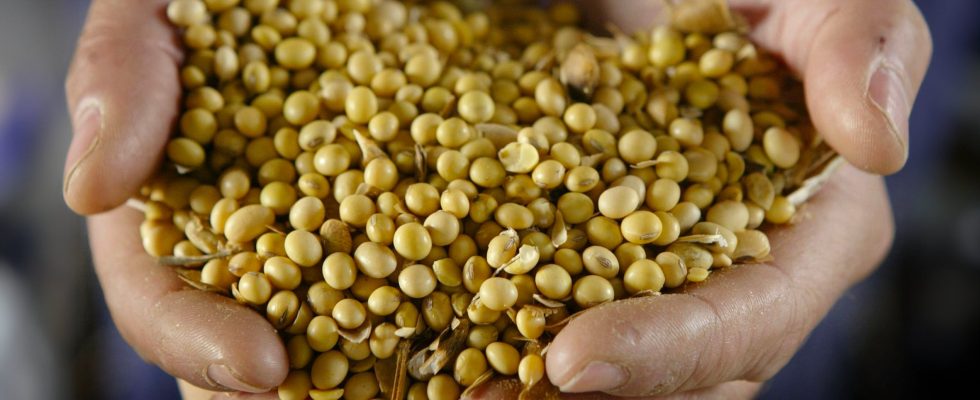The extract lasts 12 seconds. We see the American actor Nicholas Braun, in the skin of Greg Hirsch, the silly and envious cousin of Succession (HBO). With his mentor, Tom Wambsgans (Matthew Macfadyen), he forms the cult duo of the hit series which depicts the internal struggles of a family of heirs. In the image, the first, still moaning, complains about having been called a “soy boy”. The second retorts, deadpan: “Everything is fine, it’s a safe spacehere”.
12 short seconds, four lines. The essence of the gender struggles that are tearing the United States apart, in full view. Everything is there: from “safe space”, a concept of inclusive space dear to the contemporary left, used ironically by a manipulative capitalist and fan of humiliation, to the notion of “soy boy”, an insult in vogue across the Atlantic among masculinists and conservatives. They use it to demean men who are not manly enough.
@hbo My sweet, soy Greg. #succession #cousingreg
The scene, published in fall 2022, has several million views online. It marks the incursion of the expression “soy boy” into popular culture. Launched by Internet forums like 4Chan, around ten years ago, it refers to a popular belief: eating soy would give the appearance of a woman, would kill the virility of these gentlemen. The star of DuneTimothée Chalamet, or the French actor Swann Arlaud (Anatomy of a fall), would be “soy boys”, these Internet users believe they know.
Bodybuilding, flirting and Russian influence
The expression has also found its way into bodybuilding videos, flirting tutorials and even onto accounts. TikTok of Russian influencerswho praise, in French, the macho men. It can be read on threatening letters to elected officials UK. On this subject, science is affirmative: no, soy, consumed wisely, does not give a feminine face and does not reduce strength. But the plant of Asian origin has, it is true, a real impact on human hormones. So much so that it has been the subject of intense scientific controversy for around twenty years.
At the heart of the maelstrom: Professor Catherine Bennetau-Pelissero, a specialist on the issue in France. She is one of the first scientists to warn of the consequences of excessive soy consumption in infants during their first 12 months. In the 2000s, this physiologist at the University of Bordeaux noticed, with other researchers, that children who had ingested a lot of soy milk at this age more often presented certain pathologies of the reproductive system, or disrupted periods, once adults.
What follows is a “panaquès”, as the scientist says. At the time, she was contradicted by her colleagues. “American specialists told me that if soy could have such an effect, we would have seen it in Asians, because they consume a lot of it.” She doesn’t give up. The small sprouted seeds contain phytoestrogens, molecules similar to female hormones. In very high doses, they derange mice and monkeys well. Why not the man?
Atrophied testicles
Laboratories in the United States are redoing their analyses. They come to the same conclusion. Since then, a dose limit has been included in national, American and French recommendations. These are also aimed at pregnant women. A priori, the fetus is protected. It has filters that block the storm of gestational hormones. But, “it remains preferable, as a precautionary measure, to refrain from consuming it”, wrote the High Council of Public Health in particular, in an opinion published in 2022 on the subject.
Until 12 months, we experience “mini-puberty”, a prologue to adolescence. Sex hormones are racing. Then they take their leave, time for carefree time. A very high amount of soy can disrupt this process. Adults are, in fact, spared, but overdoses can occur. Like this story reported in 2022, in the Japanese magazine Internal Medicine. A man began drinking more than a liter of soy milk a day for three years. Her breasts grew; his testicles atrophied.
The masculinists therefore did not pull their beliefs out of their hat. Not enough, however, to change the morphology of the face. “Food is not a sufficient source of hormones to modify our facial characteristics. Our faces are relatively fixed after childhood,” explains Sari van Anders, researcher in endocrinology and gender at Queen’s University. Especially since certain foods can, on the contrary, all things considered, reduce the quantity of estrogen, the female hormone. And therefore, counterbalance the effect of soy.
The Asian mystery
However, excessive consumption of soy could, it seems, increase the risk of infertility, or certain cancers, even in adulthood, according to scientific literature. This, however, is not very substantiated: it is impossible to test this type of thing on humans, at the risk of knowingly exposing them to dangers. But, here again, health authorities believe that it is better to take precautions. They recommend eating soy in moderation.
Since then, Catherine Bennetau-Pelissero has worked hard to understand why in Asia, we are not sicker than elsewhere. According to scientific studies on the issue, the difference comes from tradition. In Asia, the seed was first consumed during famines and wars. Unlike grains, rats and insects don’t want them. Perfect in case of pest invasion. Counterpart: you have to cook it. As it stands, it is not edible. Asian gastronomy, by chance of history, was built on recipes that eliminate phytoestrogens. More soy, but fewer complications.
The scientific debate is not completely closed. Almost twenty years after the controversy arose, in France, the food safety agency Anses is preparing a new report. This new reading of Asian culinary habits has inspired reflection on the recommended thresholds, which should be lowered, to take into account these gastronomic differences. Because, in Europe, soy is often consumed in ultra-processed dishes, such as plant-based steaks. These processes tend, conversely, to accentuate the concentration of phytoestrogens. Series Succession does not say whether the gullible Greg Hirsch knew these scientific realities behind these fantasies.
